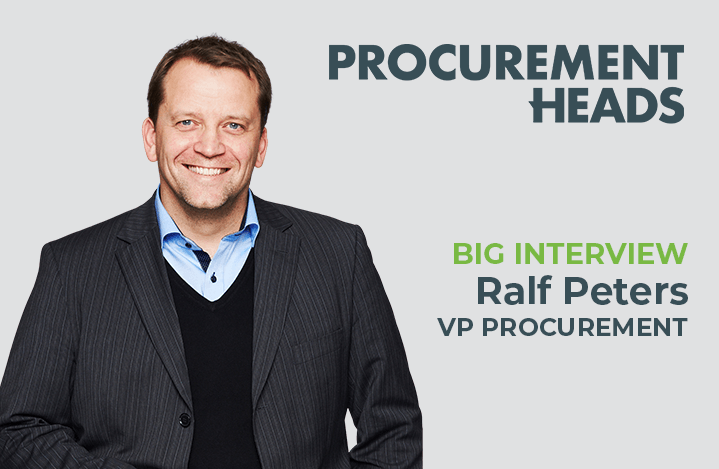In the latest of our Sustainability Big Interviews, he spoke with Procurement Heads‘ David Hazeldine spoke with to share how Coca-Cola is embedding innovative and sustainable practices across the business.
“This is one of those life events where people unlock a new level of change readiness and change capability and because it affects the whole planet it has accelerated certain thinking.
“We are not done yet, there’s a lot of things that will be impacted and there will be a lot more change around how we live and work.
“Sustainability, and how we do things differently, is critical. If you want to do the right thing, I think it is an obvious choice.”
Ralf Peters, Vice President Procurement at Coca-Cola European Partners
Why are you driving sustainable procurement at Coca-Cola European Partners and how are you implementing it across the business?
First of all, CCEP is a fairly young company and was founded in 2016 after the merger of three large bottling companies.
It is the largest Coca-Cola bottler by revenue and spans 13 countries with 300 million consumers to serve. In 2017, CCEP released its sustainability action plan, This Is Forward, which addresses key global sustainability challenges, where we know we can make a difference.
There are six elements of the action plan: Our Action on drinks, packaging, society, climate, water and supply chain.
Many of the areas where we are delivering on our sustainability commitments have direct relevance to procurement.
On packaging, we have committed to reaching 50% recycled PET content across our entire plastic packaging portfolio by 2023 – this is two years earlier than planned. As procurement, we have been able to help the business move faster by sourcing more rPET sustainably.
By 2019, 30.5% of the PET used in our plastic bottles was recycled PET. If you want to bring your recycled content to 50%, or higher, creating and sourcing material of that quality is not that easy. You can imagine that this is one of the commodities where the demand is significantly higher than the availability.
Earlier this year we were very proud to start making all of our locally-produced bottles in Sweden from 100% recycled PET, making it the first country in the world for Coca-Cola brands to do so.
It’s a proof of concept – it’s possible to set a high target but exceed it.
It’s front and centre of the work that my packaging team is doing – with the long-term goal of getting it right.
Another example is making recycling easier when you move from coloured PET to clear PET. Sprite has always had the colour green associated with bottles and cans, but to make things easier in terms of recycling, we moved to a clear PET, which helps the recycling and circular process for reuse.
Furthermore, the difference between steel and aluminium cans is vast. Aluminium can be recycled forever, and once the circular economy is established for it you don’t need so much new raw material. Steel, however, is very different. If you move from steel to aluminium, you lightweight the can significantly, which in turn means less fuel is needed for transportation. It’s an investment, but it allows you to increase the recycling rate for your packaging.
We do that in Spain and currently only have one market where we need to shift from steel to aluminium.
When you look into the initial price tag, steel is cheaper than aluminium for the raw material, but when you look at the total lifecycle, the picture is very different.
How have suppliers embraced your approach?
Many of our sustainability targets can only be reached with the engagement of our supplier base, there’s no way we can do it on our own.
Anything we want to achieve in terms of packaging, sustainable ingredients and the reduction of greenhouse gas emissions, requires clear communication with our suppliers and alignment on what needs to happen.
Fortunately, many of our largest strategic suppliers are either European companies – with a European footprint – or in some cases, global business who face similar challenges.
We have been clear about our strategy and how sustainability is embedded in that. We hosted two key supplier events, in 2017 and 2018, which were very consistent in terms of message.
In 2017, we introduced the This Is Forward strategy, and invited suppliers to discuss with us what their initial thoughts were on how that could lead to collaboration. In 2018, we returned to the same topic and discussed specific action plans to turn the ambition into real results.
Every year we publish our progress against the strategy and the data shows it works.
Suppliers understand our goals, and, in many cases are keen to work with us to make them happen.
As part of This Is Forward, we want to eliminate all unnecessary use of plastic and hard-to-recycle plastic, which is very often in the area of secondary packaging – for instance, shrink film, or a plastic wrapping around cans for a multipack.
In 2017, there wasn’t a shrink film on the market that had recycled content – and it was hard to recycle, as there wasn’t a circular economy established. So, we invited all the film suppliers to come together and find a solution. With the help of our suppliers, Today we use 100% recycled shrink film in all our markets.
In some cases, where we moved away from shrink film, we invited cardboard suppliers to come up with new technologies to use less cardboard. We wanted cardboard that is more sustainable and that can reduce and eliminate plastic for secondary packaging. This led two suppliers to come up with technologies that didn’t previously exist.
We now have with KeelClip by GPI (Graphic Packaging International) a product that uses less cardboard to replace plastic – the first of its kind that has been brought to market.
More recently we launched the CanCollar technology by WestRock in the Balearics in Spain. This innovative design replaces the plastic hi-cone rings we have traditionally used to group our multipack cans with a recyclable paperboard collar. It will save more than 18 tonnes of plastic per year. This only happens because we have the expectations and our suppliers the expertise.
What are the sustainability challenges facing procurement?
The requirement to learn is huge, the scale of the challenge is huge and we need to act fast.
At CCEP, the Board of Directors has put sustainability at the core of our strategy. We have a clear action plan and actively engage in industry consortiums that are articulating the need for change. CCEP is a member of the climate group RE100, an initiative that looks at using 100% renewable energy by 2020, which we already do.
We are a member of the Corporate Leaders Group Europe, which means we are supporting the idea that the European Union should increase the greenhouse gas reduction targets, in line with the EU goal of becoming carbon neutral by 2050. If you want to become carbon neutral by 2050, you need to set ambitious targets now.
As part of our strategy to help build a better future for our business, for people and the planet, we signed a pledge along with 150 other businesses during the peak of the first wave of COVID-19, to recover better – calling on governments and businesses to come out of the crisis stronger, through prioritizing science-based climate action.
Talking about sustainability and having action plans is one thing, but we are also assessed by third parties, and we fulfil the criteria of both the Dow Jones Sustainability Index and the One For The World in Europe.
We have been double-A listed for the Carbon Disclosure Project for four years in a row for water and climate, which not many companies have achieved.
Our strategy and direction of travel are clear and we are making strong progress with regard to our sustainability commitments.
Learning is crucial – when it came to understanding PET, I had to go back to my chemistry books from school and learn about depolymerisation. Mechanical recycling only gets us so far, so we need to learn and talk about enhanced recycling.
You can’t do that just by going back to your procurement education, you have to learn new things.
It’s rewarding and very energising when you can see what can be done.
I introduced the Sustainable Procurement Pledge (SPP) to the wider team and external stakeholder management, and they liked what they saw, and I’ve encouraged people to actively engage with the SPP.
Does the sustainability agenda make procurement a more interesting proposition for graduates and young people to get into?
I believe it is helping.
It is often a discussion that surprises people about what we’re actually doing – and that’s the ambition.
I see that from the excitement within the team – the pride in their achievements and results, and the new ways in which they are getting there.
It’s empowering and the overall engagement of my team towards the company’s strategy is so much stronger.
What’s your professional background?
My career is within Coca-Cola, I’ve worked for different bottlers and entities and lived in London, Athens, Prague and Berlin.
I started my career in finance, before moving into sales and marketing, which taught me the consumer and customer is our bread and butter and where our DNA lies.
I was a CFO in the Czech Republic, as well as our business in Great Britain – the last role before I moved into procurement. Being CFO was great from an overall responsibility level.
When the merger happened in 2016 and people looked for the right leadership in procurement, and someone who was able to embrace change with multinational and multifunctional experience – the Company asked me.
Before that, I’d never had a role within procurement other than what I get from the function!
I moved into procurement, merged three functions, embraced the idea of what procurement can do and it was the perfect fit, looking back.
One of the beauties of the role is you get a global angle.
Procurement is strong when it can scale up, we are buying a lot of things globally.
We have the Cross Enterprise Procurement Group – the procurement consortium of the Coca-Cola entities – which I’ve chaired since 2016 and can translate and transfer ideas and movement in both directions, especially when it comes to sustainability.






